

News in 2024
|
On 14-15 November 300 participants from Nepal, the region and international attended the FIG Regional Conference which was held at the Hotel Yak & Yeti in Kathmandu, Nepal. There were participants from 30 different countries hereunder Australia, Bhutan, China, Germany, India, Japan, Kenya, Nepal, Pakistan, Papua New Guinea, Saudi Arabia, the United Kingdom, and the United States spanning diverse sectors such as government, academia, civil society, and the private sector. It was especially positive to see the support and interest from Nepal.
The conference was organised jointly by FIG and the member associations from Nepal, the Nepal Institution of Chartered Surveyors (NICS). As the sole FIG member association in Nepal, NICS has consistently worked towards professional development and security for its members. The 2024 FIG Regional Conference marked another milestone in NICS’s commitment to fostering knowledge sharing and capacity building among land professionals.
The primary objective of the conference was to enhance knowledge and capacity in the Asian region to address climate change and disaster-related challenges, particularly in safeguarding the land rights of vulnerable communities. The secondary objective was to encourage collaborative partnerships among diverse stakeholders, including government agencies, academic institutions, non-government organizations (NGOs), the private sector, and civil society, to foster dialogue, share knowledge, and facilitate technology transfer at a regional level.
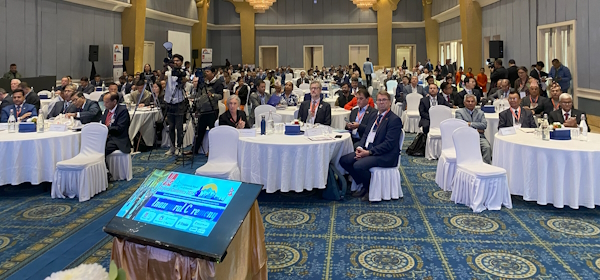
All sessions and around 70 presentations were centered around this main theme. The sessions were designed through an open call for papers and in cooperation with the conference partners World Bank, UN-Habitat/GLTN (Global Land Tool Network), Dutch Kadaster and ICIMOD.
The conference enabled the participants to:
A Call to Action Statement was a critical outcome of the event. This call to action was formally handed over to Mr Ganesh Prasad Bhatta, representing the Government of Nepal by FIG President, Dr. Diane Dumashie.
The Call to Action aims to deliver concrete strategies and actionable recommendations to
The outcome of the sessions together with the Call to Action will be published in a FIG Publication.
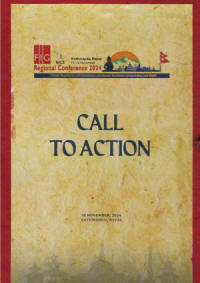 |
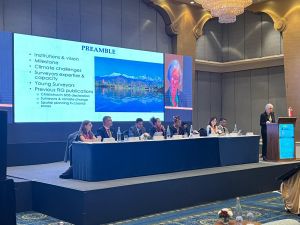 Clarissa Augustinus presents the Call to Action |
On 13 November one of the main partners, World Bank, held a Multistakeholder Workshop on Land Use Planning in Nepal. Further, at the Land Management Training Center (LMTC) a well visited 5th FIG Young Surveyors Network Asia and the Pacific Meeting was held. Under the theme "Empowered Youth for Climate Resilient Land" this gathering was a call to action for young surveyors ready to address the pressing challenges of climate change, land rights, and disaster resilience. The programme included presentations and input from both young and more seasoned/experienced surveyors. In the opening Ceremony FIG President Diane Dumashie welcomed everyone together with Mr Buddhi Narayan Shrestha, NICS, a long-term well-known face in FIG, who is still very active despite the fact that he has reached his eighties.
The first Keynote presenter was Clarissa Augustinus, Chair of FIG Task Force on Climate Compass, talking about Building the capacity of Young Surveyors as leaders for Climate an disaster action. Janak Raj Joshi, Executive Director at the Land Management Training Centre was the second keynote speaker talking about climate change and land rights and how to empower youth for sustainable land governance.
The Land Management Training Centre had made it possible to use their facilities. A very big thanks to Janik and the training centre.
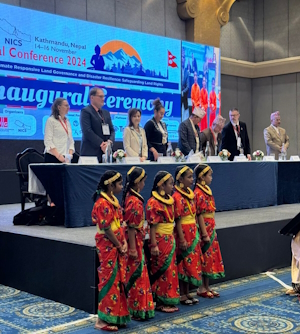
The arrival of Hon' Balaram Adhikari, Minister for Land Management, Cooperatives and Poverty Alleviation and FIG President Diane Dumashie |
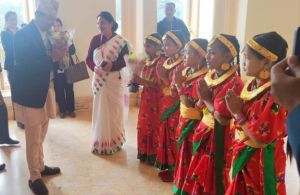 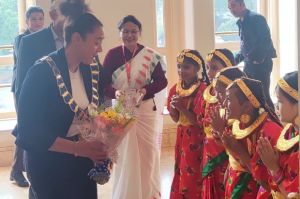 |
Minister of Land Management, cooperatives and Poverty Alleviation, Hon' Balaram Adhikari attended the Inaugural Ceremony, and he welcomed everyone to Nepal. His address is available in English and Nepalese. In his address he stated that "In today’s world, climate change is a global challenge. It is not just a concern for a specific geography but a shared global issue. One of the greatest challenges of humanity is dealing with natural and human-induced disasters. The topics of land use and its management are directly linked to climate change and disaster risk reduction. " Nepal has faced several faced the impacts of climate change, including floods and landslides, which not only affect the environment but also pose risks to the socio-economic and cultural aspects of society. He continued: "Although Nepal has made efforts to establish constitutional, policy, and legal frameworks for addressing climate change and disaster management, further debate on the impacts of climate change on land management is necessary. Our ministry has already initiated policy discussions on the interrelationship between land and climate change."
The outcome of this conference is relevant not only to Nepal and the region, but beyond. The resut of the world can learn from how Nepal has been working on climate and disaster issues over the later years.
Trimble was main sponsor of the conference. Unfortunately Bryn Fosburgh, Vice President of Trimble was not able to deliver his keynote speech. Bryn was missed, but a large thanks goes to Trimble for the support of the conference.
![]()
Co-Conference Director Ganesh Prasad Bhatta opened the conference with welcome remarks in which he welcomed all from near and far and wished all a fruitful conference. The local organising committee with Mr Ganesh in the lead have worked tirelessly and dedicated to organise this very successful conference, and is the culmination of previous meetings in 2015 and 2019.
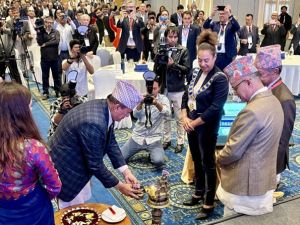 |
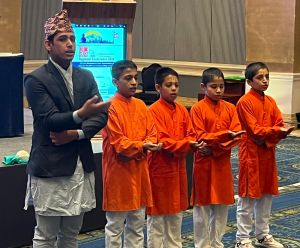 |
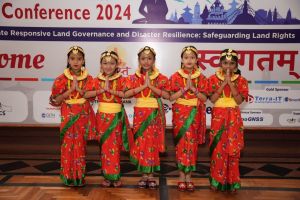 |
_300.jpg) |
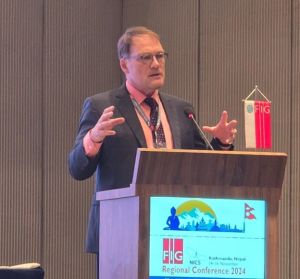 |
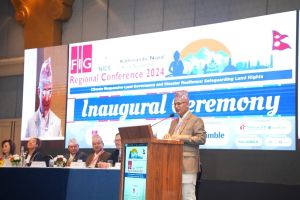 |
The two further keynote presenters were FIG President Diane Dumashie, and Mr Mika-Pettri Torhonen, Global Lead on Land at World Bank setting the scene for the following sessions and discussions.
Three honorary NICS members, all in their eighties, received FIG recognition and certificate of appreciation:
After the plenary session the first plenary session took place, on Climate Responsible Land Governance. Four speakers gave their input to the transformative role of surveyors and land practitioners in tackling climate changes and how we can possibly safeguard vulnerable communities, promote climate-responsive land governance and strengthen resilience against disasters. Speakers were Mr. Pranab Ranjan, co-founder of Landstack, a global south think tank, Markus Kukkonen, World Bank, Ganesh Prasad Bhatta, joint Secretary and Spokespoerson for the Ministry of Land Management, Cooperatives and poverty Alleviation, and finally Paula Dijkstra, Director of Kadaster International.
The plenary session that started day 2 of the conference elaborated around Disaster Resilience, and how disaster resilience can be built across the Asia region with practical strategies. Speakers were Birendra Bajaracharya, Chief of Party of SERVIR-Hindu Kush Himalaya, a joint initiative of NASA and USAID, Rishiraj Dutta, a Disaster Risk Reduction Practitioner and Researcher, working as Capacity Development Lead at the Asian Disaster Preparedness Center (ADPC) in Thailand, Jagannath Aryal, Associate Professor at the University of Melbourne, Ikram ul Haq, presenting a case study of PULSE implementation in Punjab, a World Bank funded initiative on the digitization of urban lands and cadastral mapping in Punjab, and finally Dinesh Manandhar, Associate Professor at the University of Tokio on Low-Cost GNSS Receiver Systems for Disaster management, Dynamic Air-Quality Monitoring, and Gateless Toll Gate.
Outcome from all plenary and technical sessions will contribute to the final publication.
Technical sessions were run in 3 parallell breakout tracks. One track was dedicated FIG Commission 9 and World Bank on valuation of the real estate.
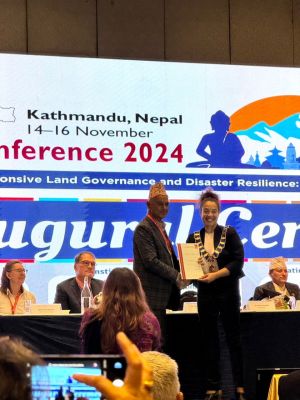 |
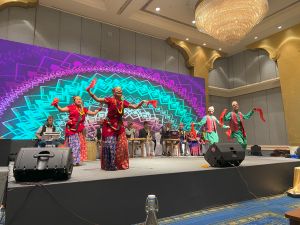 |
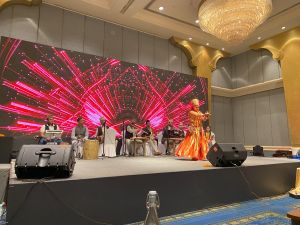 |
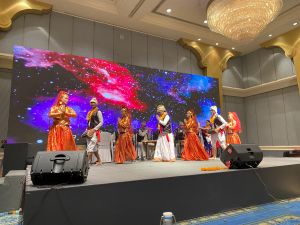 |
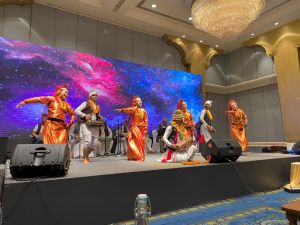 |
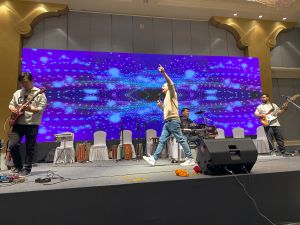 |
On Friday 15 November a Closing Ceremony ended this highly useful, operational and inspiring conference. Dr Clarissa Augustinus presented the Call to Action. Hereafter the Call to Action was handed over by FIG President Diane Dumashie to Ganesh Prasad Bhatta representing the Ministry. Hereafter Diane Dumashie held her closing speech thanking all for coming and especially for the support from Nepal to the topic and the conference. It was two very productive days. Diane thanked all the local organisers and helpers who had made the two days work smoothless.
FIG Foundation had sponsored four regional Young Surveyors to this conference and 20 young surveyors from Nepal. All received a special certificate from the Foundation. FIG and the local organisers thanked the Foundation for their generous and very helpful support.
FIG sends a final and special thanks to the local organisers for their engagement, structured approach and efficiency with this conference.
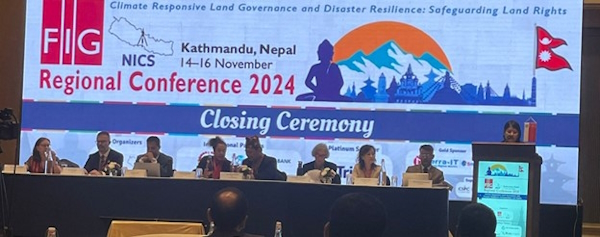
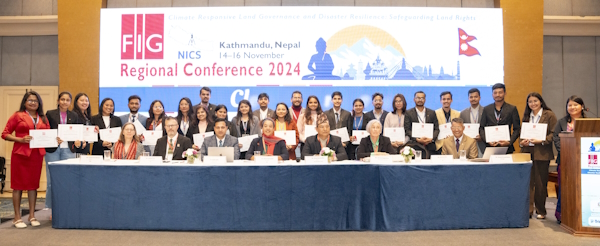
FIG Foundation grant recipients
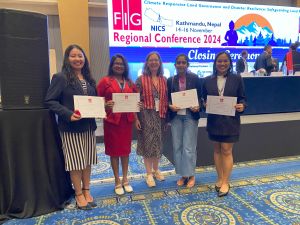 |
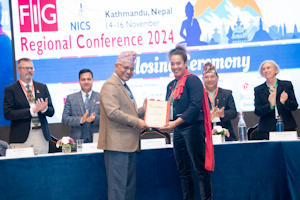 |
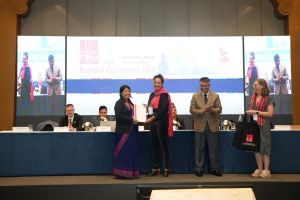 |
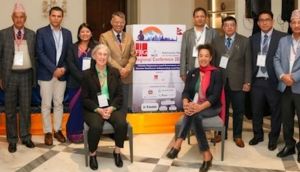 |
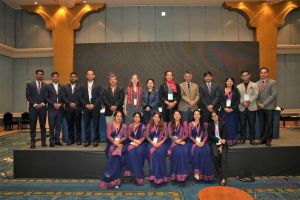 |
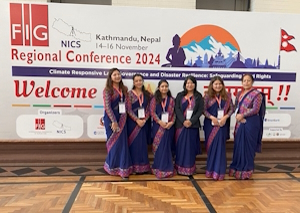 |
On Saturday 16 November the local organisers had put together an exciting combined social and technical tour which was well visited by the regional and international participants. This gave an insight into both culture, nature and the surveying work in Nepal. The morning started very early with a bus ride out of Kathmandu and up in 2100 m height to see the sunrise. Unfortunately, the moment the buses arrived the clouds arrived, too. Nevertheless, it was a wonderful sight towards the mountains. The view station functioned as a fix point for surveyors, too, and local surveyors gave insights into their work in the mountains and the measurements. The nearby Geodetic Observatory was a stop on the tour as well as the local survey station who kindly offered a warm cup of tea.
The tour continued to Bhaktapur, a UNESCO World Hertitage Site with intereting historical and articistc treasures. A guide explained about the temples, the main squares and culture of Nepal.
After a walk, insights into the Nepal culture and a group photo, the next stop was the Land Management Training Center (LMTC), where the Young Surveyors meeting was hosted a few days earlier. The training center is under the ministry and offers various levels of training courses to land professionals.
Next stop was the Kathmandu University, after a refreshing and delicious lunch at the Training Centre. This stop started with a group photo, and hereafter the participants were divided into two groups getting a tour around the university. Thanks to the representatives from the University and Training Centre for opening up for us despite being a Saturday.
The final stop on the tour was a special area in Hadigaun, Kathmandu. A community-driven initiative has secured Car-free Saturdays enabling people to enjoy their Saturday in the pedestrian streets incl a diverse street food experience. One of the initiators of this initiative met with the group and showed around the area, telling about how this was established. Hopefully other areas will learn from their experience.
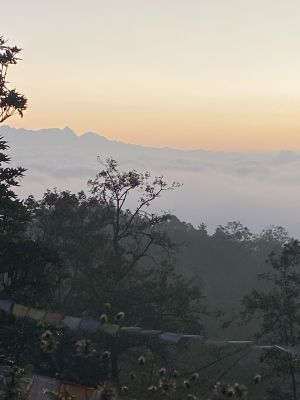 |
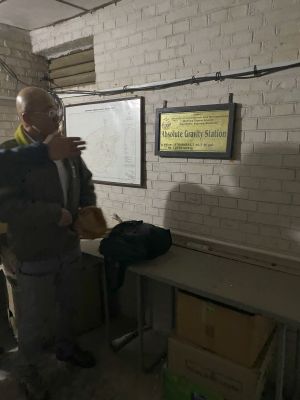 |
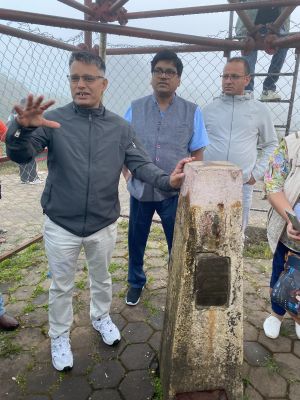 |
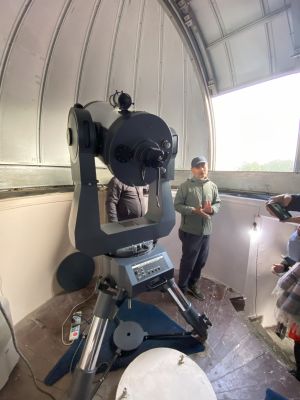 |
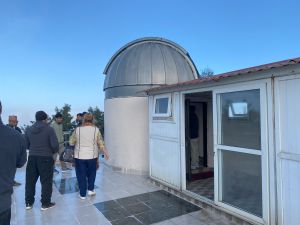 |
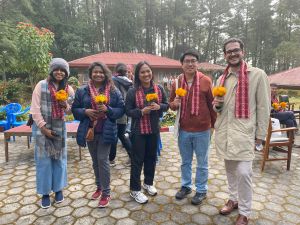 |
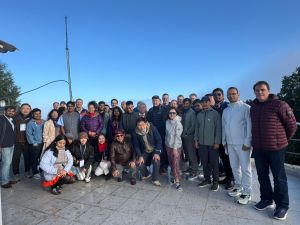 |
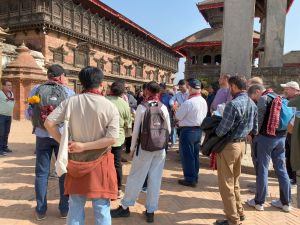 |
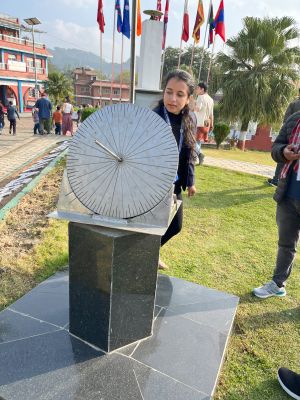 |
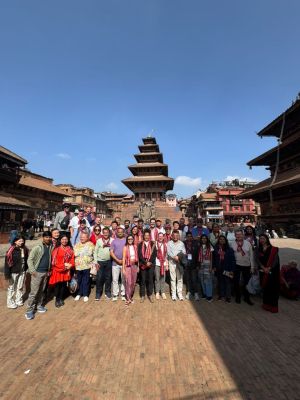 |
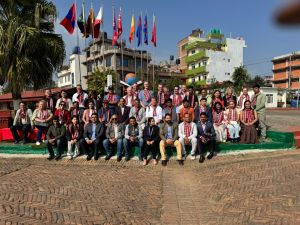 |
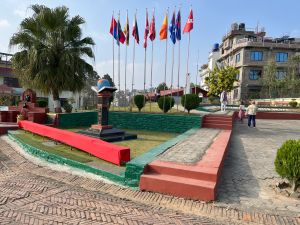 |
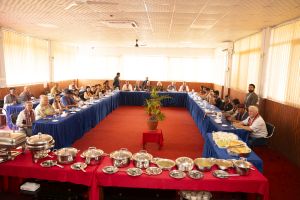 |
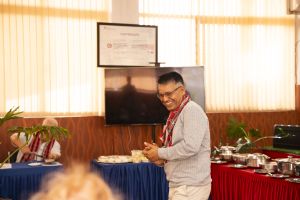 |
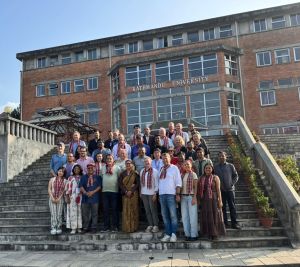 At Kathmandu University |
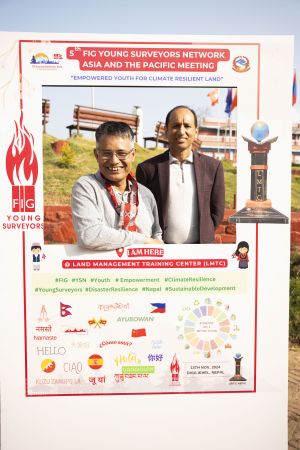 |
A special thanks to all our partners, supporters, sponsors and exhibitorsPartners: |
|||
|
|
|
|
|
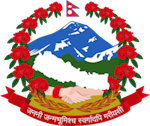 |
Government of Nepal;
Ministry of Land Management, Cooperatives and Poverty Alleviation; Land Management Training Center Survey Department
|
FIG Commissions and Task-Forces : |
FIG Task Force on Climate Compass FIG Task Force on SDGs FIG Commission 2 - Professional Education FIG Commission 5 - Positioning and Measurement FIG Commission 7 - Cadastre and Land Management FIG Commission 9 - Valuation and the Management of Real Estate |
The Conference is supported by: |
|||
 Community Self Relience Center |
 |
|
|
|
|
 |
|
|
|
 |
|
 |
 |
|
 |
Louise Friis-Hansen
November 2024